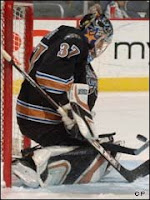Panthers 6 - Capitals 3: Brought to You by the Letter...
 As in: how the hell do you lose to the Panthers...AGAIN?
As in: how the hell do you lose to the Panthers...AGAIN?Not only how do you lose to the Panthers, but how do you keep losing games that you HAD to win and were SUPPOSED to win.
6-14-0 in their last 20 games has basically knocked the Capitals out of the playoffs. 3 of those games were against the bottom feeding Panthers, 1 against the lowly Coyotes. Winnning those four games keeps them even during that last stretch and now 1 point behind Carolina for the #8 playoff spot.
Instead, the Capitals have played flat, struggled mightily on the power play and basically looked like a bad team. Not and inexperienced team--a BAD team. Some of the numbers from last nights Panthers game are a microcosm of what has happened to the Capitals in the last 20 games:
- 2 for 9 on the power play (including a boatload of wasted 5 on 3 time)
- 3 for 6 on the penalty kill
- Outshot 32-30
- Olie allows 6 goals on 32 shots (.813 save percentage)
- Capitals fell behind early (2-1 at the end of the first) and then fell further behind (5-1 at the end of the second).
So in a nutshell, bad defense, sloppy play, flat early, uninspired afterwards. So what's the reason?
Is it coaching? Well certainly when your team started out 15-10-7 and then loses 14 of 20 games following it, you've gotta hold some of the blame. The Capitals seem to be a team that comes out either unprepared or just flat most nights. Other teams take advantage of their early lull and put them behind the eight ball. That in turn disheartens the team who fall further downhill and by the time they pick themselves up and play well, its too late.
Thats the other thing: they still play well. If it were a matter of them getting outplayed when they hustled and worked hard, it would be one thing. But when the Caps show up to play, they are nearly unstoppable. If theres inconsitency, it has to be with the coach. I thought Hanlon was a good motivator; I guess I was wrong.
It is management? Well as I said earlier, they can play well so the talent's still there. But its just so few and far in between. I have never liked George McPhee and never supported the plan to rebuild through the draft. Why? George McPhee CANNOT draft. Let me give you an example, he had 3 first round picks in the 2001 NHL draft. He spent them on Boyd Gordon, Steve Eminger and Alexander Semin. Only one of those guys, Semin, has proven to be worth the first round pick spent on him. In that same year, McPhee passed on Marek Zidlicky and Marek Svatos as well as a bevy of young goaltenders who could be groomed as Kolzig's successor (Cam Ward, Peter Budaj and Cristobal Huet are in that list).
But this year specifically, the Caps got hot early. They had what looked like the opportunity to make the playoffs with, arguably, the least talent of anyone. What did McPhee do? Nothing. Did he really think that this team would survive into January and February when players started getting banged up? What if Ovechkin, Semin or Olie had gotten hurt? It could have knocked us to the bottom. But instead of reinforcing a young sparky team, he let injuries plague us and allowed our AHL guys to get NHL minutes. Not a bad idea in philosophy, but it hurt the Caps chances at the playoffs. The fact is, he should have been making deals like the Jurcina trade in December. He sat on his hands too long and allowed this to become the year that never was.
Is it the system? Well show me a team that dumps-and-chases on the power play. Has three players on one side of the ice when cycling the puck in the offensive zone. Has a goaltender who gives up huge rebounds with a defense in front of him who can't clear traffic. Basically doesn't realize that most of their goals come from rushes and won't spread the ice. A team that can't make a breakout pass, ices the puck than most other teams, cannot establish a semblance of a solid powerplay and is constanly out of position on defense.
Yes, the system is at fault. Whoever is in charge of drawing up the gameplan needs to be fired. This system was designed for the old NHL, as was this team. Now, you need speedy players, mobile defensemen (McPhee's still picking those 6'5 guys who can't keep up with the fast forwards) and solid young goaltending. The breakout pass, weaving into the zone and an agressive forcheck are all things that make a team successful now. No one has figured this out. The system needs to be revamped. The more you teach these young kids to do the bad things the Caps do now (like dump into the zone when your team is up a man), the harder it is for them to "unlearn" it.
So basically all we have to do is suffer through another 30 games before more promises of "playoffs next year" come from Ted and George. The problem is, and I've said it before, it should have been this year.
Labels: Budaj, Cam Ward, Carolina, Coyotes, Eminger, Gordon, Huet, Kolzig, Leonsis, McPhee, Ovechkin, Panthers, Semin, Svatos, Zidlicky


